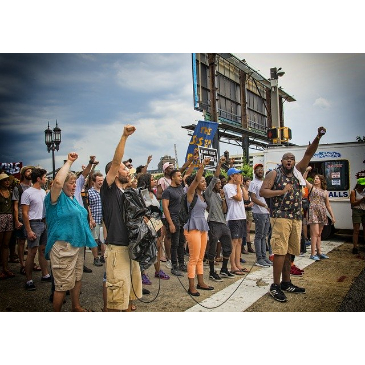The rights to assemble and protest are among one of the most protected groups of rights in the American legal system. And while the government is not allowed to infringe upon these rights, it is very important for any and all citizens to be aware of the restrictions the government is allowed to put on these activities. It is always very helpful to understand the ways in which the state of Tennessee requires protesting to occur, and the charges you might be facing as a result of civil disobedience.
Where Am I Allowed to Protest?
 All of your Constitutional rights apply only to the actions of the government. This means that your 1st amendment rights to assembly and protest do not apply to private property, such as businesses or residences, and the owner’s of that property have total control within the law over who is allowed to be there. While some private property owners may welcome and encourage protesting activities, you are not guaranteed any right to be there under the Constitution.
All of your Constitutional rights apply only to the actions of the government. This means that your 1st amendment rights to assembly and protest do not apply to private property, such as businesses or residences, and the owner’s of that property have total control within the law over who is allowed to be there. While some private property owners may welcome and encourage protesting activities, you are not guaranteed any right to be there under the Constitution.
And while you are generally allowed access to property owned and operated by the government, there are certain types of property you can not access in the interests of safety and security. The public areas where protestors tend to and are legally allowed to gather are public parks, sidewalks, and streets.
How am I Allowed to Protest?
While the Constitution protects your basic rights of assembly and protest, state, city, and county governments are allowed to regulate the manner in which these activities happen. In general, groups of protesters are not allowed to block the normal flows of pedestrian or vehicle traffic in the areas that they are operating. And depending on local regulations, you might have to adhere to policies like the operating hours of a public park, or the requirement of a permit to gather in a park or march in the streets. It is always best to research your local county and city ordinances to find out what specific regulations need to be met in order to hold a legal protest. Due to the nature of protesting, governments often use their discretion to vary the leniency with which they enforce or respond to the violation of these usual regulations, like allowing a march to occur through popular streets without organizers having obtained a required permit, but those regulations that are outlined in state code or local ordinances can always be legally enforced.
What Can I Be Arrested For?
Some of the more frequent charges issued against individuals arrested while protesting include state laws prohibiting disorderly conduct, failure to obey, and resisting arrest. Read below the details of each law according to the Tennessee State Code, in order to understand what sort of behavior is legally allowed, as well as the punishment for breaking these specific laws.
Disorderly Conduct
TCA § 39-17-305:
(a) A person commits an offense who, in a public place and with intent to cause public annoyance or alarm:
(1) Engages in fighting or in violent or threatening behavior;
(2) Refuses to obey an official order to disperse issued to maintain public safety in dangerous proximity to a fire, hazard or other emergency; or
(3) Creates a hazardous or physically offensive condition by any act that serves no legitimate purpose.
(b) A person also violates this section who makes unreasonable noise that prevents others from carrying on lawful activities.
(c) A violation of this section is a Class C misdemeanor.
Failure To Obey
TCA § 55-8-104:
(a) No person shall willfully fail or refuse to comply with any lawful order or direction of any police officer invested by law with authority to direct, control or regulate traffic. (b) A violation of this section is a Class C misdemeanor.
Resisting Arrest
TCA § 39-16-602:
(a) It is an offense for a person to intentionally prevent or obstruct anyone known to the person to be a law enforcement officer, or anyone acting in a law enforcement officer’s presence and at the officer’s direction, from effecting a stop, frisk, halt, arrest or search of any person, including the defendant, by using force against the law enforcement officer or another.
(b) Except as provided in § 39-11-611, it is no defense to prosecution under this section that the stop, frisk, halt, arrest or search was unlawful.
(c) It is an offense for a person to intentionally prevent or obstruct an officer of the state or any other person known to be a civil process server in serving, or attempting to serve or execute, any legal writ or process.
(d) A violation of this section is a Class B misdemeanor unless the defendant uses a deadly weapon to resist the stop, frisk, halt, arrest, search or process server, in which event the violation is a Class A misdemeanor.
